
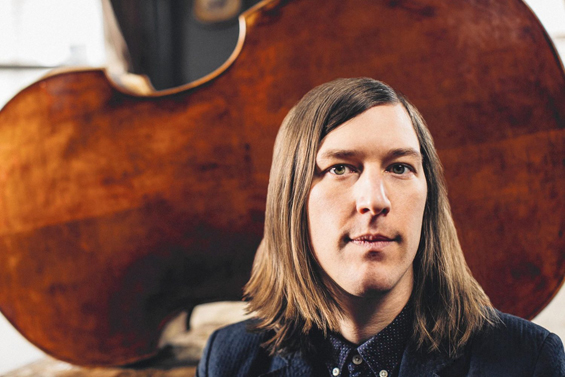
TEN QUESTIONS WITH MATT ULERY
In his own way, Matt Ulery has had a transformative and catalyzing impact on the Chicago jazz scene. The bassist and composer has amassed an impressive discography over the past decade that reflects his command of multiple styles, from chamber jazz to small ensembles. He's also done much to elevate the profiles of musicians who regularly perform with him, including pianist Rob Clearfield, Zach Brock, and Jon Deitemyer. Ulery also has established himself as a formidable composer, with many recordings capturing his distinctive voice and penchant for lyricism and sophisticated structures. While a number of standout albums were issued between 2012-14 on Dave Douglas's Greenleaf Music label (By a Little Light, Wake an Echo, In the Ivory), Ulery's recent releases have appeared on his own Woolgathering Records, including 2018's Sifting Stars and this year's trio date Wonderment and his latest, the quintet album Delicate Charms. textura was thrilled to have an opportunity to speak with Ulery recently about the new release as well as about his connection to Chicago and the musicians who've helped bring his music so vividly to life.
1. Unlike some artists, your ‘voice' as a composer is already present on your earliest releases; much the same might be said of a personal vision. It takes no more than seconds, for example, to draw a connecting line from the lyrical melodicism of “The Farm About Home” from 2009's Themes and Scenes to “The Effortless Enchantment” on your latest, Delicate Charms. How did this distinctive and instantly recognizable composing voice come about?
In fact, the first album released under my own name and on Woolgathering Records (not counting my earlier punk ska recordings from the late ‘90s) was 2008's Music Box Ballerina, which features family favourites Zach Brock, Jon Deitemyer, Rob Clearfield, Tim Haldeman, and Thad Franklin. I suppose I've always looked for the hipness in the music and what else I could do amidst all the different styles I've been called upon to play as a bassist, that rhythm, melody, and middle voice harmony we get to express when we look for our own sound.
2. From the beginning of your career to today, you've often arranged for your material to be performed by chamber ensembles and full orchestras rather than the standard jazz quartet. That choice also speaks to a boldness of character your approach to music-making exemplifies. Where did this desire for an ambitious presentation come from, and are you simply intrepid by nature or did you consciously decide to pursue a less conventional approach?
I've always looked at it as an experiment. Acoustic instruments have always intrigued me. I remember once seeing the film Waking Life, which was one of those Slacker-like, philosophically meandering, conversation screenplay-type movies but animated, based on drawings done on the film. In the movie there's a scene where a tango band's joyously rehearsing. I've strived for that vibe in a way. I also have to mention the recorded music that Dave Douglas was making in the late ‘90s/early 2000s with different folk-based chamber jazz ensembles (that I know about). These things seemed to help pave the way for me to explore more folk music elements in musics I would put me name on. Certainly the music of Charlie Parker, John Coltrane, Miles Davis, and Charles Mingus has left deep impressions.
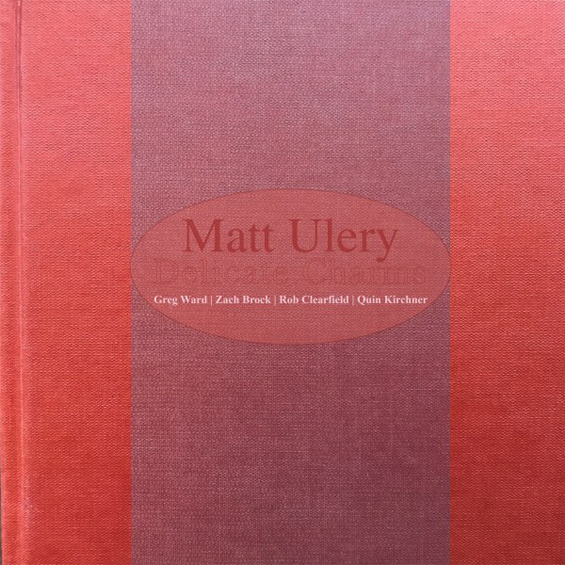
3. As someone who's proudly championed Chicago as a major centre for music-making and artistic creativity, you've become rather synonymous with the city as a jazz ambassador. Where did this deep connection to Chicago originate? And are there particular Chicago artists that inspired you when you were coming up and establishing yourself?
I'm from Rockford, Illinois and moved to Chicago when I graduated high school in 2000 to expand into its scenes. I could name so many names that inspired me in Chicago, but I would leave too many out. I would say that my peers on any given day have always been the most inspiring. I spent a lot of time at Fred Anderson's Velvet Lounge for the first five or so years in Chicago; no doubt that time made an impressive impact on me. I've had the opportunity to play and learn from a lot of different kinds of folk musics here: African American, Serbian, Bulgarian, Macedonian, Columbian, Venezuelan, Mexican, to name a few. The music in this city is incredibly inviting and giving.
4. You clearly have a special relationship with the musicians that appear on your recordings, many of who have played with you on a number of them. There isn't room to single out every one, but certainly Rob Clearfield, Jon Deitemyer, and Zach Brock are three who've played key roles in performances of your music. Could you say a few words about what they've contributed to it?
These are great friends and collaborators of mine. It's like an instrument, the way it can shape the way you play. I can say that Rob, Zach, and Jon, to name a few great ones, have over time shaped the way much of my music sounds and feels, and the way I react to it as a bassist, too. I couldn't possibly say enough good things about them. I'm learning that you should always ask the right people to play your music, if you can figure out what and who that might be.
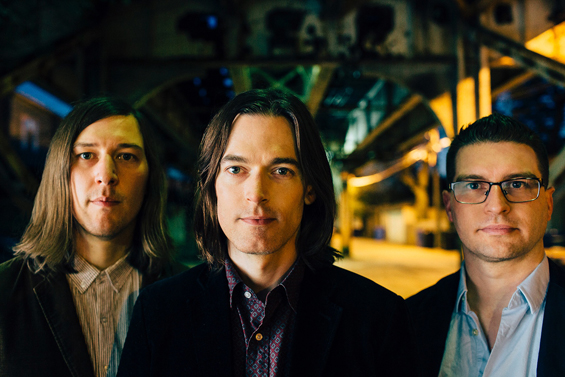
Matt Ulery, Zach Brock, and Jon Deitemyer
5. You have so many projects on the go that I'm trying to imagine how you keep them all straight. I'm visualizing something like a huge wall calendar where dates for performances, recordings sessions, and other projects are recorded, and of course there's also the considerable amount of time you need for writing and arranging pieces and managing Woolgathering Records. How do you manage to keep all those plates spinning, and what's a typical day in the life of Matt Ulery look like?
It seems much of my time is devoted to learning other people's music, including close collaborators, ‘random' gigs, keeping up on tunes especially for the weekly jam session I've been hosting on Mondays with Quin Kirchner at the Whistler for the last two years, preparing programs for concerts, making time for writing and, perhaps most importantly, cooking multiple times daily. There's an endless supply of communications, and I'm always looking out for that next spark, that seed of an idea I can make time for exploring and exploiting.
6. In terms of personnel, your latest release, Delicate Charms looks like a quintessential Ulery collection, with you on double bass joined by Greg Ward on alto saxophone, Zach Brock on violin, Rob Clearfield on piano, and drummer Quin Kirchner. In what ways does this new quintet album differ from what you've released previously?
This group of cats is especially thrilling. It's hard to explain, but these musical (and otherwise) personalities are some of the most intriguing and energizing to me. The blend of violin and alto sax is deep, and the rhythm section is as powerful as any I could imagine. After spending two weeks in residence at the Guimaraes (Portugal) Jazz Festival in November 2018 with this music and these people, I was easily inspired to pursue this recording and tour.
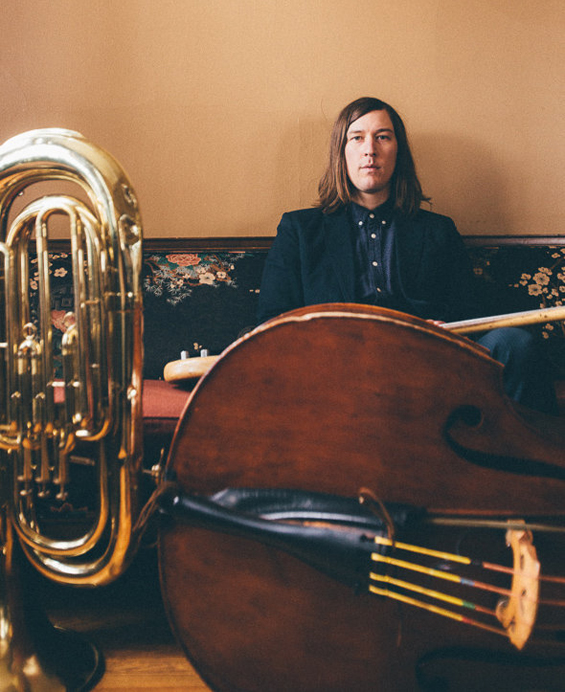
7. What led you to choose bass as your number one instrument and how old were you when you took it up? Was it something that immediately felt right when you first tried it out? As you've been playing bass (upright and electric) for more than two decades, how has your playing style changed over time?
I started playing bass as twelve (I'm thirty-eight) because I wanted to play Nirvana songs (and more). It was easy because it was fun and still is. I also began playing tuba/sousaphone at the same time and still play that, too (look out for Pollinator in 2020). I imagine style is always evolving or rather expanding and developing. It seems like the more you put into it, the more you get out.
8. Could you say a few words about how Woolgathering Records has evolved since its inception and the role you see it playing, not only in helping to get music by your colleagues out into the world but also in helping to build community for the scene of which you're a part? Recent releases have seen, for example, Rob Clearfield's solo piano set Wherever You're Starting From and trumpeter Russ Johnson's Headlands, a live recording that also features you, Clearfield, and Deitemyer.
Woolgathering Records has certainly stepped it up. Working with record labels such as 482 Music (for one album) and Greenleaf Music (for three) and Woolgathering Records, I've learned what an independent label could and can do and that, ultimately, we'll always care even more than anyone else. If we can provide the same services for art's sake, we might as well work a little harder to help realize these challenges.
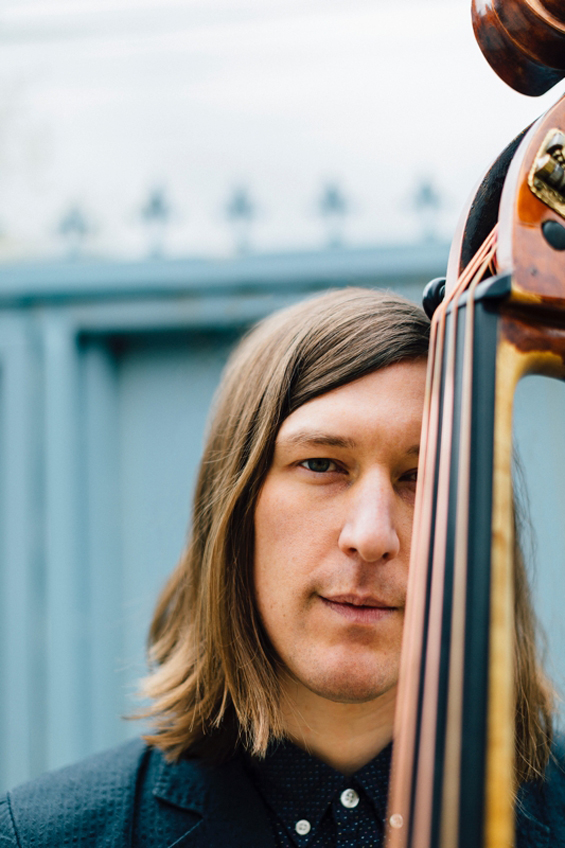
9. How strategically do you approach your releases? Did you purposefully decide that after 2018's Sifting Stars, with its orchestral focus and emphasis on art songs, you wanted to issue a less formally through-composed album such as Wonderment, your recent trio date with Brock and Deitemyer or do the releases more develop organically and intuitively?
In hindsight, it seems I've alternated a bit between the ‘jazz' record and the ‘chamber or orchestral' project. I reflect on having no strategy. It's always just the next thing, making another art project. It seems there's hardly ever enough opportunities to explore these projects in performance.
10. You've worked with ensembles ranging from Eighth Blackbird and Miami String Quartet to the New Millennium Orchestra of Chicago and Brazos Valley Symphony Orchestra and are also a faculty member at Loyola University Chicago. In what ways have these experiences had an impact on your composing?
Having a goal is absolutely necessary. That creative limitation is crucial. Think of anything ... think of a colour ...
website: MATT ULERY
October 2019![]()